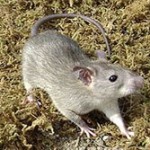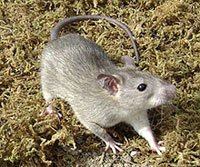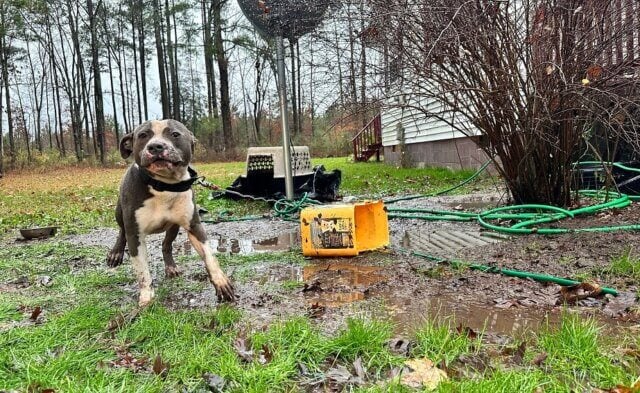 Portrayed as one of the protagonist’s worst fears in George Orwell’s 1984 and used in epithets such as “rat fink,” rats get a bad rap in our society.
Portrayed as one of the protagonist’s worst fears in George Orwell’s 1984 and used in epithets such as “rat fink,” rats get a bad rap in our society.
Many people don’t know that rats are highly social animals with individual personalities. They become attached to each other, love their own families, and easily bond with their human guardians. Rats love seeing kind people they know and will often bounce around waiting to be picked up and played with.
Studies by Bowling Green State University suggest that when rats play or are playfully tickled, they make chirping sounds that are strikingly similar to human laughter.
Rats are also natural students who excel at problem solving. They have excellent memories and a complex language system—they can communicate by touch, smell, and sound (at frequencies too high for the human ear). They are also fastidiously clean animals, grooming themselves several times a day.
Rats have been shown to risk their own lives to save baby rats—even if the babies weren’t their own.
Yet, our society subjects millions of rats every year to what is perhaps the cruelest death that an animal can experience—that of a glue trap victim.
Also known as “glue boards” or “glue trays,” these vile devices consist of a piece of cardboard, fiberboard, or plastic that is coated with a sticky adhesive designed to capture any small animal who wanders across its surface.
Trapped rats and other animals suffer immensely during the many hours (or often days) that it takes for them to die. Many animals break bones and rip off patches of skin and fur and parts of tongues and faces as they struggle to escape, and some even chew off their own limbs in an attempt to free themselves.
Manufacturers generally instruct consumers to toss out the often still-living animals with the trap, leaving the panicked animals to die slowly from shock, dehydration, asphyxiation, or blood loss.
The good news is that with your support, PETA’s efforts have led retailers all across North America—including Family Dollar, Rite Aid, Long’s Drugs, RONA, CVS, USA Drug, Osco Drug, Walgreens, Safeway, and SUPERVALU—to purge glue traps from their shelves. This totals more than 40,000 stores!
PETA is also working to eliminate the market for glue traps by persuading businesses to use alternative methods of rodent control. Thanks to our campaign, glue traps are no longer used by 21 of the top 30 financial institutions, including Morgan Stanley, Goldman Sachs, and Citigroup.
And there’s progress for our rat friends Down Under: Following correspondence with PETA Australia, several of the country’s biggest financial institutions—including ANZ, Westpac Banking Corporation, Commonwealth Bank, Virgin Money Australia, and Suncorp—have introduced policies against the use of glue traps in any of their offices or branches.
Other establishments that have gone “glue trap–free,” thanks to PETA, include Starbucks Canada, Kaiser Permanente, Compass Group, the U.S. Social Security Administration, and the Dallas–Fort Worth International Airport as well as numerous public school systems, municipal government offices, and universities.
As a result, countless rats and other small animals have been spared agonizing deaths.
Sadly, millions of rats are still killed in laboratories across North America every year. Before their often gruesome deaths, these wonderful animals spend their days in barren cages amid their own waste. They are force-fed test chemicals, cut open, burned, shocked, starved, and addicted to drugs—almost always without anything to dull the terrible pain.
Rats are so maligned that there is even a loophole in the U.S. Animal Welfare Act that excludes them from the definition of the world “animal,” even though rats feel pain and fear every bit as much as dogs, cats, or monkeys do. This has allowed rats to be subjected to a level of cruelty and neglect that would be illegal against almost any other mammal. PETA has been working for years to close this loophole and will continue pushing until we win.
In the meantime, we are making terrific progress in stopping the use of rats (and all animals) in painful and lethal chemical and product tests.
For example, PETA’s scientists were responsible for changes made to the U.S. Environmental Protection Agency’s endocrine-disruptor screening program that have the potential to save more than 3 million animals—including hundreds of thousands of rats—from being poisoned, killed, and dissected!
PETA also discovered that major beverage manufacturers were funding cruel experiments on rats and other animals to assess toxicity or to bolster nutritional claims about their products—even though not one of these experiments was necessary or required by law.
POM Wonderful had paid experimenters to force elderly, stressed rats to balance on an accelerating, spinning rod and find a hidden platform submerged in a water maze (or drown trying). PepsiCo and its partners had funded experiments in which rats were injected with cancer-causing chemicals. Japan’s ITO EN—the world’s largest green tea company—claimed deadly experiments on rats were required by the Japanese government. Unilever—the world’s largest maker of tea, including Lipton and PG tips brands—funded tests in which rats had holes cut into their intestines and were fed tea ingredients through a tube in their throat.
You’ll be pleased to know that because of the persuasive power of PETA and our international affiliates, Unilever agreed to stop testing its tea products on animals, and POM Wonderful, PepsiCo, and ITO EN—along with Coca-Cola, Ocean Spray, and Welch’s—agreed to end all animal tests!
PETA also works to end the exploitation of rats by the “pet” trade. In 2012, a PETA investigation of Global Captive Breeders, LLC (GCB)—a company in Lake Elsinore, California, that bred and sold reptiles and rats—prompted law-enforcement officials to mount the largest seizure of animals ever in California and the largest rescue of neglected rats in U.S. history. All the animals—more than 600 reptiles and 14,000 rats—were surrendered by GCB owner Mitch Behm and taken into the city’s custody.
Most of the rats were bred and sold to be fed to snakes and other reptiles kept as “pets.” Tubs used for housing flooded frequently, slowly drowning countless panicked rats and leaving hundreds of others to struggle to keep their heads above water as it rose.
Rats were routinely grabbed by the tail and slammed into metal posts, racks, tables, and walls when workers decided to kill them. Many didn’t die quickly and were thrown into trash bins or reptile enclosures while still alive and convulsing.
Thanks to PETA’s investigation, GCB has been effectively shut down, and law-enforcement officials are expected to file criminal charges soon. We are also using this investigation to expose the ruthless, greed-driven pet trade and to show consumers why they should never patronize stores that sell live animals.
PETA is grateful to our members’ loyal support of its work stopping unimaginable suffering. You are truly a hero for animals!
WHAT YOU CAN DO
Help us save animals by educating others about glue traps. Please watch PETA’s video showing the victims of these traps at and send it to everyone you know. Thank you so much for caring!
This article was originally published in PETA’s Augustus Club newsletter. For information on this club honoring those who are leaving a legacy for animals through a planned gift to PETA, please contact us.





